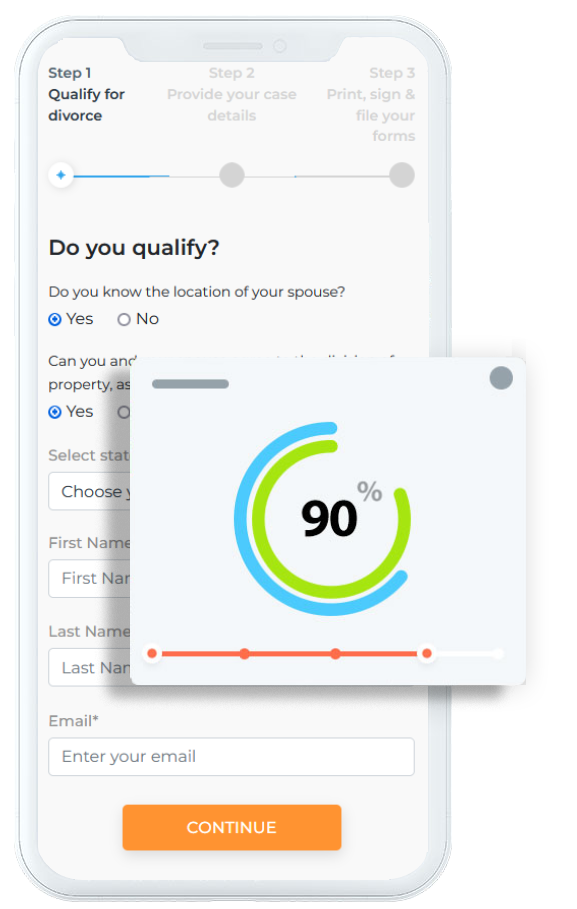Online Divorce Made Simple
Complete your forms online while you stay comfortable at home and file for an uncontested divorce without the need to hire a lawyer. We offer a convenient and affordable way to prepare and manage your divorce documents. Get the forms and instructions you need to divorce online.
of court approval
of divorce documents
Start Divorce The Easy Way
Get a full package of divorce documents using our reliable service. All forms are chosen in accordance with the specifics of the client’s case and fully meet the state legal standards. Take your time to answer a comprehensive questionnaire and download filled-out divorce papers online once they are ready.
How it Works
When ordering papers for an online divorce process on our website, first you need to complete a short preliminary questionnaire to understand whether our services are suitable for you. Your online divorce kit will be available for downloading within the deadline you choose after you submit your answers.
1. Provide your case details to see if you qualify for online divorce
After that, make a payment and proceed with answering the main set of questions, namely, personal info, divorce details, data about children and whether custody is required, and financial and property matters.
2. Review, print, and sign the documents
Once you are done answering questions, our system will start selecting and filling out the papers you will need to complete your divorce online. When the forms are ready, you will be able to access them in your profile to download and print them out. When you are ready to sign the forms, check the filing instructions to see the appropriate guidelines on the matter.
3. File documents with a local court
Now you can file for divorce online if this option is available in your county or head to the local court, make the requested copies, pay a filing fee, and submit your divorce forms to the clerk’s office. Be sure to ask the clerk in advance if you can apply for divorce online. You will also need to serve your spouse and wait for the court to process your case.
Why Choose Our Online Divorce Service?
You will be pleasantly surprised at how quickly and easily you can prepare your documents, saving thousands on lawyers’ fees. There is no need to struggle with paperwork, or rely on Googling to prepare your forms.

Get the full set of forms for your legit online divorce for a one-time payment of $159. No hidden fees. Choose a cost-effective option without having to worry about attorney fees that can be as high as $500 per hour.

All the documents you receive are court-approved and completed following the current legal standards of the state. You will also get our understandable filing guidelines.

Instant divorce online is a reality. Forget about the complexities of preparing divorce documents. Instead of filling out multiple papers yourself, choose our service and receive case-specific forms for a fast divorce online.

If you have any concerns about an Internet divorce, our pricing policy, etc., contact our customer support agents, who are ready to assist you 24/7.
Complete Your Divorce Papers Online
Applying for divorce online will be an easy task to handle on your own if you delegate document preparation to us. Ordering our services, you will receive:
- a case-specific set of forms needed to start and finalize your divorce
- child-related documents at no extra fee
- step-by-step filing instructions so that you can comfortably handle each stage of the divorce process.
When you are ready, get a divorce kit online or receive it by mail for a small extra fee.
What Documents Will You Get
Every state has specific requirements concerning documents couples may need when they file for divorce. Some of the forms you may require to begin a divorce process include:
- Petition or Complaint for Divorce
- Response Documents
- Child-Related Documents
- Final Documents
- Miscellaneous Documents
Once you complete our questionnaire, our software will choose the set of forms for your no-fault and full-agreement divorce based on your answers.
Compare Your Options for Filing for Divorce
Online divorce service is a great solution for divorcing couples who want to manage paperwork quickly and efficiently. It is particularly suitable for uncontested cases when spouses agree on all divorce-related issues. You just need to specify the details of your divorce case in the questionnaire, wait till the forms are ready, and submit them to the local court.

Divorce with a Lawyer
If you are considering hiring a lawyer for your divorce, pay attention to several key aspects of legal representation to understand whether this option will work for you.
You will need to depend on the lawyer’s schedule, potentially delaying proceedings if they are overbooked. The total attorney fees may exceed several thousand dollars, leading many spouses to take out loans to cover the substantial legal costs. Potential court battles with a lawyer will result in additional stress and anxiety.

DivorceCanBeSimple
If you and your spouse have agreed on all aspects of your marriage dissolution, using paperwork preparation services for your legal divorce online is the most convenient option. This route provides you with court-approved forms for a quick uncontested divorce process, user-friendly online divorce technology to guide you, step-by-step filing instructions for completing a do-it-yourself online divorce, responsive customer support to answer any questions, and reasonable pricing compared to hiring an attorney.

Online Divorce Websites
If you choose alternative divorce services, be mindful of possible risks such as poor understanding of the legal documentation you’ll need to complete, the usage of pre-designed forms that may be unsuitable for your case circumstances, long turnaround times before receiving your materials, confusing pricing policies with extra fees that tacked on, unresponsive support agents who provide little assistance, and a lack of detailed filing instructions to guide you through the process correctly.
What Our Customers Say About Us
State-Specific Divorce Forms
Online Divorce FAQ







